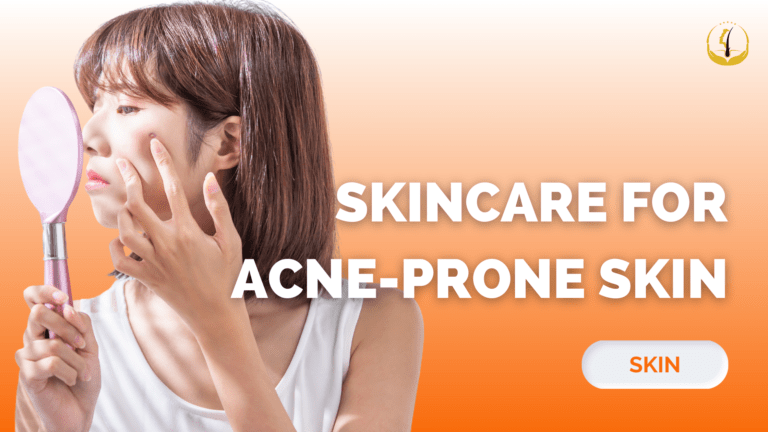Acne-prone skin can be a persistent challenge, but with a carefully crafted skincare routine and a dash of patience, achieving clear and healthy skin is within reach. This guide aims to delve into effective ways to combat acne, provide anti-aging skincare tips, explore natural skincare remedies, and address concerns related to sensitive, oily, and dry skin. Additionally, we will uncover the often underestimated benefits of sunscreen for all skin types.
Clearing Acne for a Healthier Skin
Clearing acne stands as the primary concern for those grappling with acne-prone skin. Here are essential steps to guide you toward achieving blemish-free skin:
- Gentle Cleansing: Initiate your routine with a mild, sulfate-free cleanser. Avoid abrasive scrubs that can exacerbate acne, cleansing your face twice daily to eliminate excess oil and impurities.
- Salicylic Acid: Integrate a salicylic acid-based exfoliant into your routine. This helps unclog pores and reduce acne breakouts effectively.
- Hydration: Moisturize, even if you have oily skin. Opt for a non-comedogenic, oil-free moisturizer to keep your skin hydrated without clogging pores.
- Spot Treatment: Utilize a spot treatment with benzoyl peroxide or sulfur to address individual pimples directly.
- Consistency: Consistently adhere to your skincare routine. Results may take time, so patience is key—avoid switching products too frequently.
Anti-Aging Skincare for Acne-Prone Skin
Addressing anti-aging concerns is crucial while treating acne-prone skin. Here’s how to strike a balance:
- Retinoids: Consider incorporating a gentle retinoid product to combat fine lines, wrinkles, and acne scars. Begin with a lower concentration to avoid irritation.
- Antioxidants: Embrace skincare products rich in antioxidants like vitamin C and E. These protect your skin from free radicals and promote collagen production.
- Sun Protection: Sunscreen becomes your best ally for anti-aging. Opt for a broad-spectrum sunscreen with SPF 30 or higher—further insights on sunscreen benefits will follow.
- Hydration: Maintain plump and youthful-looking skin by including a hydrating serum or moisturizer in your routine.
Natural Skincare Remedies
Many natural remedies can complement your skincare routine without resorting to harsh chemicals. Consider the following:
- Tea Tree Oil: Leverage the antibacterial properties of tea tree oil to reduce acne. Dilute it with a carrier oil before applying it to the skin.
- Honey: Raw honey, with its antibacterial and anti-inflammatory properties, serves as an excellent spot treatment or a component of a homemade mask.
- Aloe Vera: Aloe vera soothes irritated skin and aids in healing. Apply pure aloe vera gel or opt for products containing aloe.
- Green Tea: Packed with antioxidants, green tea can reduce inflammation and redness. Brew a cup, let it cool, and use it as a toner.
Sensitive Skin Care for Acne-Prone Skin
Sensitive skin demands extra care to prevent irritation. Here’s how to manage it:
- Patch Test: Always patch-test new products on a small area before applying them to your face.
- Fragrance-Free Products: Steer clear of skincare products with added fragrances, as they can be harsh on sensitive skin.
- Gentle Cleansing: Use a mild, fragrance-free cleanser specifically designed for sensitive skin.
- Minimal Ingredients: Opt for skincare products with minimal ingredients to reduce the risk of irritation.
Oily Skin Treatment and Dry Skin Concerns
Managing oily and dry skin can be challenging when dealing with acne. Tailor your routine to your specific needs:
- Oily Skin: Use a gentle foaming cleanser to remove excess oil. Don’t skip moisturizing, as dehydrated skin can produce even more oil.
- Dry Skin: Opt for a creamy, hydrating cleanser. Incorporate a rich moisturizer and consider using a humidifier to add moisture to the air in your living space.
The Benefits of Sunscreen for Acne-Prone Skin
Managing oily and dry skin alongside acne can be challenging. Tailor your routine to your specific needs:
- Oily Skin: Employ a gentle foaming cleanser to remove excess oil. Don’t skip moisturizing, as dehydrated skin can produce even more oil.
- Dry Skin: Opt for a creamy, hydrating cleanser. Incorporate a rich moisturizer and consider using a humidifier to add moisture to your living space.
The Benefits of Sunscreen for Acne-Prone Skin
Now, let’s focus on the often underestimated benefits of sunscreen:
- Protection from UV Rays: Shield your skin from harmful UV rays, reducing the risk of skin cancer and premature aging.
- Prevents Hyperpigmentation: Sunscreen aids in preventing and fading hyperpigmentation, including acne scars and dark spots.
- Minimizes Redness and Inflammation: It can reduce redness and inflammation in acne-prone skin, making breakouts less noticeable.
- Preserves Collagen: Sunscreen preserves collagen, keeping your skin firm and youthful.
Achieving clear and healthy skin for individuals with acne-prone skin requires a meticulously planned skincare routine encompassing effective acne treatments, anti-aging measures, natural remedies, and considerations for sensitive, oily, or dry skin. Embrace the crucial role of sunscreen in protecting your skin and maintaining its youthful appearance. By following these guidelines consistently, you can embark on the journey to radiant, blemish-free skin that you desire.
